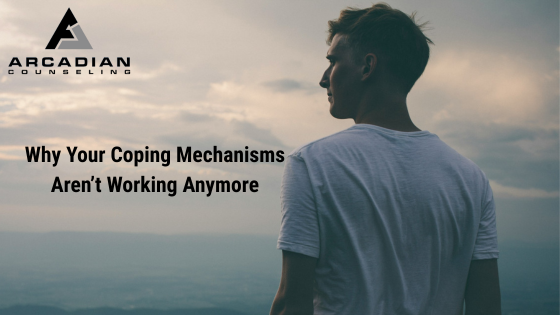You don’t crumble under pressure. You get things done, take care of your responsibilities, and keep the plates spinning. To most people, it looks like you’re crushing it.
But behind the scenes?
You’re worn out. You’re running on fumes. And the coping mechanisms you’ve used to keep yourself afloat—whether it’s pouring a drink at the end of the day, staying late at work, or numbing out with your phone—aren’t cutting it anymore.
That’s because most of your coping strategies were built for survival, not sustainability.
Smart Men Build Strong but Outdated Coping Strategies
Let’s be clear: these strategies didn’t come out of nowhere. They worked.
They helped you get through high-stress seasons. They helped you keep moving when slowing down didn’t feel like an option.
- Alcohol gave you a way to decompress quickly
- Overworking helped you feel in control and validated
- Screens and distractions helped you escape when your mind wouldn’t slow down
They were intelligent adaptations at the time. You weren’t broken. You were managing.
But over time, those coping mechanisms start to wear thin, and instead of helping you reset—they become the very things draining you even more.
How to Know When Your Coping Mechanisms Are Failing You

It doesn’t usually hit all at once. It’s subtle. Quiet. And easy to dismiss.
But here are the signs I see most often with the high-functioning men I work with:
- You start drinking every night, not because you want to, but because you need to in order to wind down
- You obsessively check email or Slack late at night—even though no one’s asking you to
- You “relax” by zoning out with your phone or binging TV—but it doesn’t leave you feeling refreshed
- You feel distant from your partner or kids, even when you’re physically there
- You find yourself snapping, isolating, or feeling numb—and wondering why
What used to take the edge off now just feels like another weight on your shoulders.
From Coping to Avoiding
Here’s the big shift that happens with outdated coping:
You stop dealing, and start avoiding.
That drink doesn’t bring you peace—it helps you dodge anxiety for a few hours.
That late-night work grind doesn’t move the needle—it just distracts you from what you’re really feeling.
That endless scrolling doesn’t recharge you—it numbs you.
These behaviors are no longer solutions.
They’ve become delays. And they’re keeping you stuck in survival mode.
What Healthier Coping Actually Looks Like

Healthy coping isn’t about being a monk or giving up comfort. It’s about finding strategies that help you reset, not retreat.
Here’s what that might look like in real life:
- Intentional decompression: taking 10 minutes of silence before walking into your house—not checking email in the driveway
- Exercise that energizes, not punishes—because you’re using your body, not escaping your mind
- Talking about what’s going on, even if just with one trusted person—so it doesn’t build up
- Therapy, where you can finally be honest without having to fix everything or pretend it’s all fine
These habits build resilience. They don’t just help you get through the day—they help you reclaim your energy, your attention, and your relationships.
You Don’t Have to Do It the Old Way Anymore
Just because something used to work doesn’t mean it still does.
And just because you’ve made it this far using survival-mode coping doesn’t mean you have to keep doing it that way.
You’re not weak for needing new tools.
You’re just ready to stop surviving—and start living with clarity, energy, and purpose.
Let’s Build Something Better Together
I help professional men who are burning out on their own coping habits finally figure out what works.
If you’re tired of the stress, the short fuse, or the constant mental fog—let’s talk.
Not about overhauling your life overnight—but about taking one step toward real relief and progress.
James Killian, LPC is the owner of Arcadian Counseling, a private practice in Greater New Haven, CT, specializing in helping over-thinkers, high achievers, and perfectionists reduce stress, increase fulfillment, and enhance performance — so they can move From Surviving to Thriving. He primarily works with professional men navigating high-pressure careers and meaningful life transitions. His approach blends psychological insight with real-world experience to support men in reclaiming clarity, strength, and purpose.

